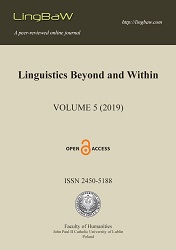How does foreign accent affect template matching mechanisms? ERP evidence from Polish
How does foreign accent affect template matching mechanisms? ERP evidence from Polish
Author(s): Hanna KędzierskaSubject(s): Foreign languages learning, Syntax, Pragmatics, Psycholinguistics, Western Slavic Languages
Published by: Wydawnictwo KUL
Keywords: ERPs; comprehension; prediction; bilingualism; accent;
Summary/Abstract: Sentential context is believed to have particularly robust effects on the processing of foreign-accented speech (Lev-Ari 2015). However, recent neurolinguistic studies investigating the relation between non-native speech and semantic predictability suggest that anticipation mechanisms are, in fact, hampered during the processing of foreign accents (Romero-Rivas et al. 2016). The current study is an attempt to shed more light on this issue and establish whether the mechanisms responsible for categorical template matching remain active during the processing of non-native speech. The study investigated neural reactions towards high cloze probability template endings (i.e., the endings of fixed phrases selected in a pre-test) and their unexpected counterparts. 120 Polish sentences were recorded by a native Polish speaker and a non-native (L1 Ukrainian) speaker of Polish in order to investigate the reactions towards an easily recognizable foreign accent. The brain activity of 28 monolinguals (L1 Polish) was recorded during the EEG sessions. In native-accented speech, violations of high cloze probability items resulted in a broadly distributed negativity followed by a P600 effect. No comparable effects were observed in the case of foreign-accented speech. These results are compatible with previous findings (Hanulíková et al. 2012; Romero-Rivas et al. 2016) as they confirm that linguistic anticipatory and reanalysis processes are hampered in the case of non-native speech.
Journal: Linguistics Beyond and Within (LingBaW)
- Issue Year: 5/2019
- Issue No: 5
- Page Range: 61-74
- Page Count: 14
- Language: English

